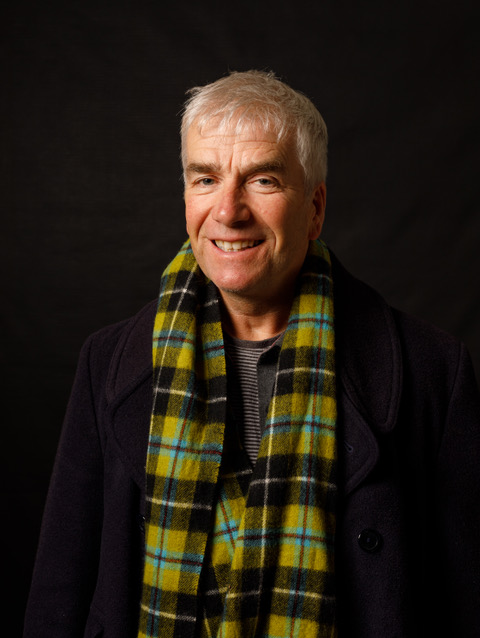
There are few people more connected to Port Isaac than John Brown.
One of the most isolated places in Britain, Port Isaac is in a hidden cove, set amongst stunning scenery on Cornwall’s North-Atlantic coast. A humble fishing village since at least the fourteenth century, this sleepy settlement is now famously recognisable as the filming location for the hit TV show, Doc Martin.
But Port Isaac is also the home of the Fisherman’s Friends; a group of singing fishermen who were discovered in 2010 and have since achieved international success. John Brown is one of the founders of the group. He is a true Cornishman, who has lived in Port Isaac for most of his life, and very few people know the village better than he does…
‘These days I do walking tours to show people around. I love seeing the ‘wow’ in people’s faces. For many, visiting Port Isaac is a dream, and I’m often told how lucky I am to live here. I am, and I just like to share that!’
You must have a deep connection with Port Isaac?
Yes, very much so. I grew up in the village. My father was a fisherman here, his father was a fisherman, his father was a fisherman, and we’ve been fishermen for as long as we know. I haven’t heard that my family comes from anywhere else.
What was village life like growing up?
Everybody knew everybody and the school was the centre of the village, because all of the shops were on that side. We had three butchers, several grocery shops, someone selling dresses and clothes. Toy shops, sweet shops, you could even get your boots repaired. You could get everything done in the village! And in the late sixties and seventies people didn’t have cars.
So you went to school in the village?
Yes, I went to Primary School at what is now the Old School Hotel. I was there from five to eleven years old. Back then Port Isaac had the only school for many miles, even though it was only a small village. All the children from the surrounding farms came to school in Port Isaac. When my grandmother was young she had to walk two miles over the cliff from Port Quin to get to school everyday.
Did you appreciate going to school in a place like Port Isaac?
At the time it didn’t mean much. Initially we didn’t get a television, so we didn’t have any idea what was going on in the outside world. I had a lovely school experience. I could look over from the playground and see my dad coming back in on his boat and my uncles coming back in on their boats.
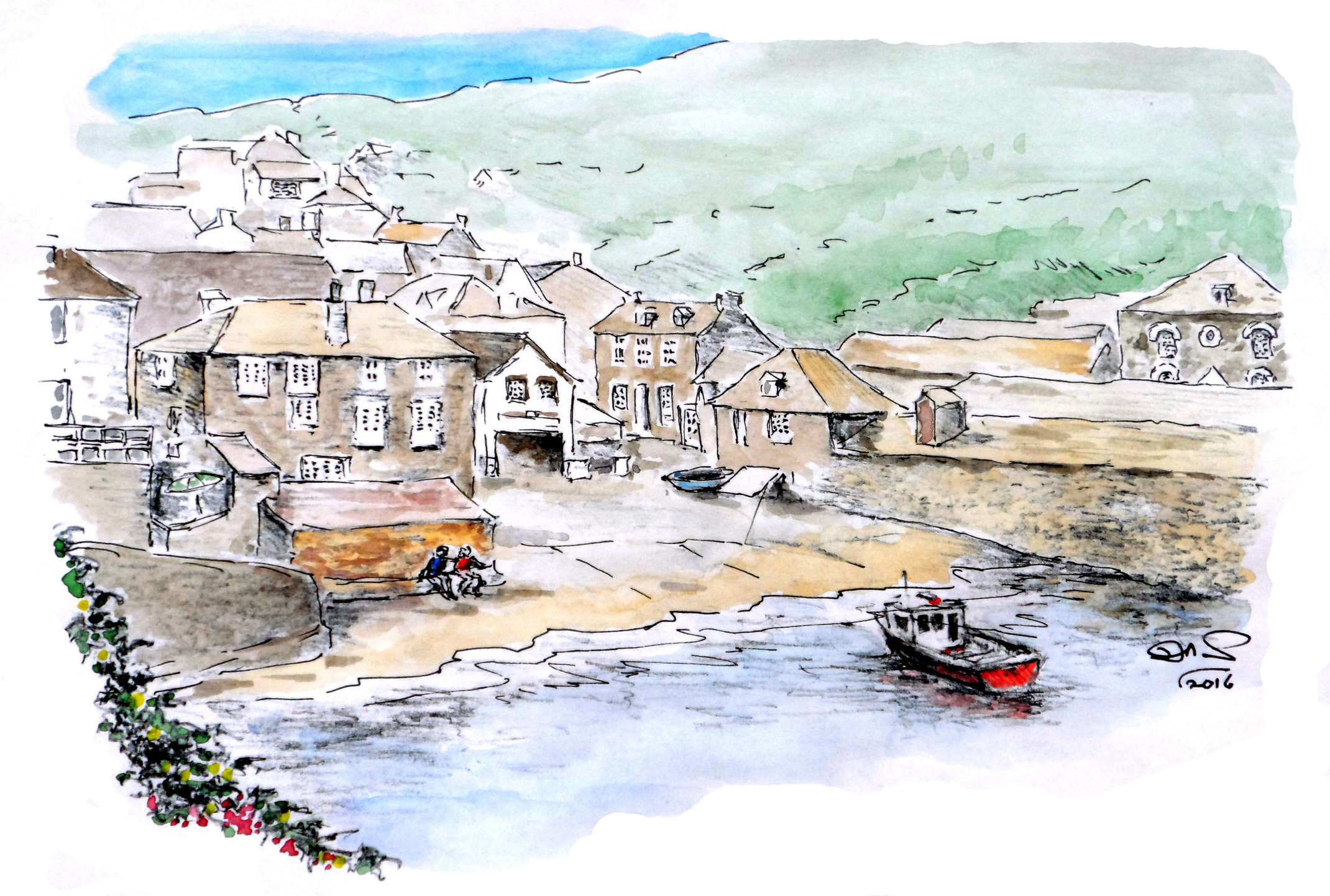
That’s a nice view from a playground.
Yeah. I remember that our playground was on a bit of a slope actually. There was one time when we were playing and I insulted this older boy, and he chased me towards the edge of the cliff. One of the dinner ladies, called Mrs Gilbert, saved me from going over. She stepped in front of me as I was heading towards the wall. If she hadn’t stopped me, I would have gone over the cliff.
The wall can’t have been very high?
No, it was only small. We used to play football as well. Just before the school bell went, someone would kick the ball over the wall, down the cliff and onto the beach. The rule was that if the ball went over we were allowed to run down to go and get it, so you’d get to miss five minutes of the next lesson. We used to take it in turns!
What did you do after school?
I went to secondary school in Camelford, about ten miles away. Literally as soon as we got home around five o’clock, me and my brothers and other lads would all jump straight in our father’s little dinghies and row out to sea to catch mackerel and check the crab pots. There would be about thirty dinghies out there catching mackerel in the evenings. You don’t ever see that now though.
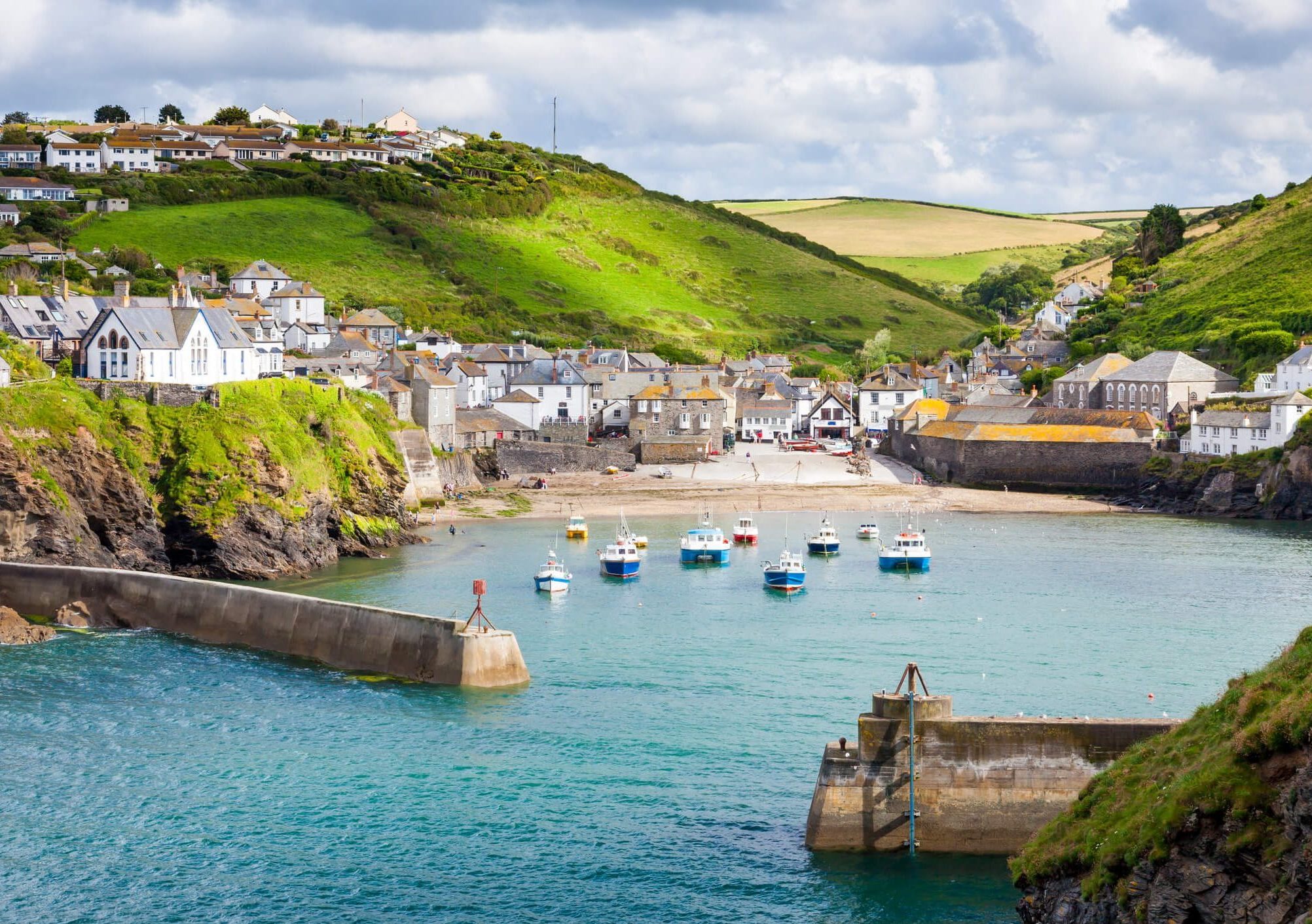
How far out were you going?
Oh, we’d go out a mile or two. Some boats had a small engine, and the rest of us would row. My uncle gave me my first boat when I was eleven years old, a twelve-foot dinghy called ‘The Daphne’. I don’t know why he gave it to me, or why it was called ‘The Daphne’. But we’d share the work with two catching mackerel and the other rowing. We’d be out until it was starting to get dark. We had no lights. Or life-jackets for that matter. Nothing like that. But at sixteen I sold the boat to buy a moped.
So then you entered the world of work?
Yes. I started at sixteen and worked for an engineering company in Wadebridge. I did a four-year apprenticeship. Then I joined the Merchant Navy. When I first started I was based in Southampton, on the sand-dredgers. I did that for eighteen months to get experience. Then I went deep-sea, working on oil-tankers, containers and bulk-carriers, going all around the world. I went to America, Australia, Canada, Hong Kong, Japan, all over the place. I did that for about three years, until I had a revelation and finished.
What was your revelation?
I was on a boat one day, with a couple of older guys, who were about thirty-five. We’d get to New York or Jamaica and ask them if they were coming ashore. They’d say ‘Nah, we’ve been here before.’ For me, that moment was a revelation. I didn’t want to end up like them. I joined the Merchant Navy to see the world and have good experiences. I was lucky, when we’d get somewhere, like New York, a few of us would jump in a taxi and see everything we wanted to see. Then, once we’d seen everything, we’d go and have a few beers!
You must have had some adventures during your shore visits?
Oh well yes, yeah, er…can’t really talk about that. Haha!
So what did you do after your revelation?
After I got home I was sent to Southampton again to join another job on a container ship. I didn’t know anything about the job. I walked up the gangway to the mess, and I didn’t know anybody. I went to sign articles, which meant I’d get certain food, money and be paid off at the nearest port at the end of the job. I said to the personnel manager ‘Where are we going?’ He said ‘Australia and New Zealand, for five months.’ I said ‘Hang on there,’ and went down to find my cabin. I wrote out my resignation letter, there and then. Those were the last places I wanted to see, so I was happy to do that job and then come back to Port Isaac.
And were you happy at the end?
Absolutely. But I did join one more boat after that. I met this chap from Glasgow and we went to London ‘on the beer’ for four days. He said that he was joining another boat. He was an engineer as well and all engineers say you’ve got to go onto a steam boat to know what real engineering is like. The QE2 was looking for engineers in Southampton, so I agreed to sign-on there, just to say I’d been on a steam-ship.
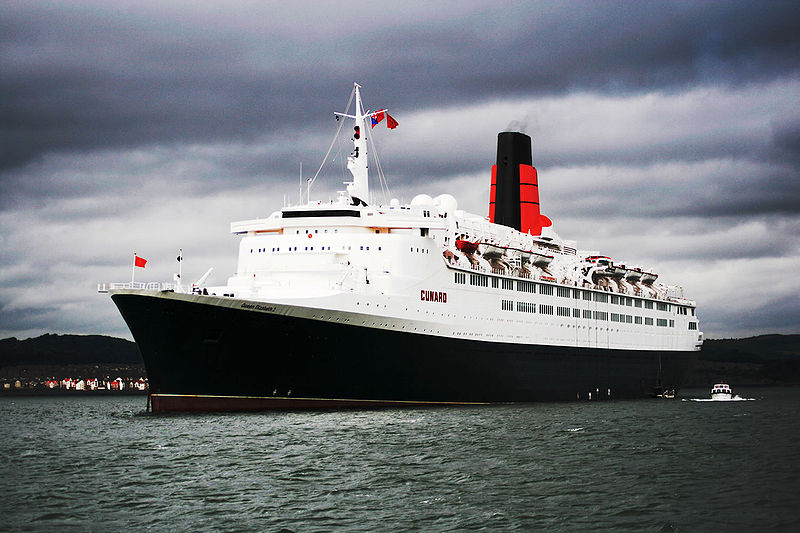
How long was that job?
Not long, less than a month. It was murder. She was hot and sweaty and whilst it was lovely five-star opulence on the decks, below deck she was terrible. She was a floating death-trap. The second engineer told us ‘Don’t do anything to anything without seeing me. Don’t even undo a bolt without seeing me. Because someone could get killed.’ I’m glad I did it, but wouldn’t like to do it again!
So post revelation, you returned to Port Isaac. Is that when you started fishing?
Yes, I started fishing full-time. I crewed on my father’s boat, and at the same time I bought a locally made fibreglass hull and made my own boat. We fished lobsters and crabs, and dogfish.
Could you make a decent living?
You wouldn’t make a fortune but you could always make a living. It was one of those jobs that the harder you pushed and the more days you went out, the better it was. My elder brother was fishing as well. If I had a good day, I’d have the next day off. If he had a good day, he’d want a better one the next day.
So he’s the competitive one, and you’re the easy-going one?
He’s very competitive yeah. I’m more relaxed!
What are your main memories from your days as a fisherman?
The highlights were going out. You’re with your crew, the sun’s coming up; the things you see in the water, on the water, the birds. The whole thing is absolutely magical.
I remember the first time I was out on a boat on my own. I was on my dad’s dinghy. My mum was there and her mother, who was quite elderly. She fell jumping out of the boat and they had to take her to hospital. So my father said, ‘Right, all yours now John.’ I was nine years old, and he pushed me off from the beach and I was out on my own.
Did you ever worry about the perils you can face on the water?
The danger didn’t come into it. When you are young you think you are invincible; and you can take on the world. If you went out on a rough day when the older men didn’t want to go out and you came back with a catch – that was the best feeling in the world to me. To go out and battle the waves and wind, and still come back again was great. I wasn’t married at the time, so it didn’t really matter that much. Although I’m not sure my mother would have agreed.
Were there any close-calls?
Yes, lots; you can’t take your eye off it for a second. Once I was being dragged over the side with a rope around my boot. I wasn’t paying attention, but then just managed to shimmy my boot off in time before I flopped over the side. That was frightening. I lost a £30 pair of waders though.
What were the worst conditions you’ve experienced at sea?
In my Merchant Navy days I was on this bulk carrier, travelling back to Wales from the States. We came across a storm in the Mid-Atlantic. It was so bad you could see the boat twisting. There were a series of four of five big ships ahead of us that sunk in the storm. Our boat was old, but the Captain said ‘We’re doing everything we can.’ There’s no point watching the waves, so we just went below and went to sleep.
How did you sleep that night then?
I slept very well actually! There was nothing you could do. When I woke up there was a foot and a half of water in the accommodation.
If you were leaving the Merchant Navy now, would you want to go and fish?
Yes, I would still go fishing. But I think it’s more difficult now. There’s probably less money in it than there was. Things have moved on with technology, but it’s still a young man’s game.
In 1995, a group of lads in Port Isaac started singing together. They became known as the Fisherman’s Friends, famous for singing traditional local songs called Sea Shanties. John Brown is one of the original members of the group, who, over the last 25 years, have achieved huge success…
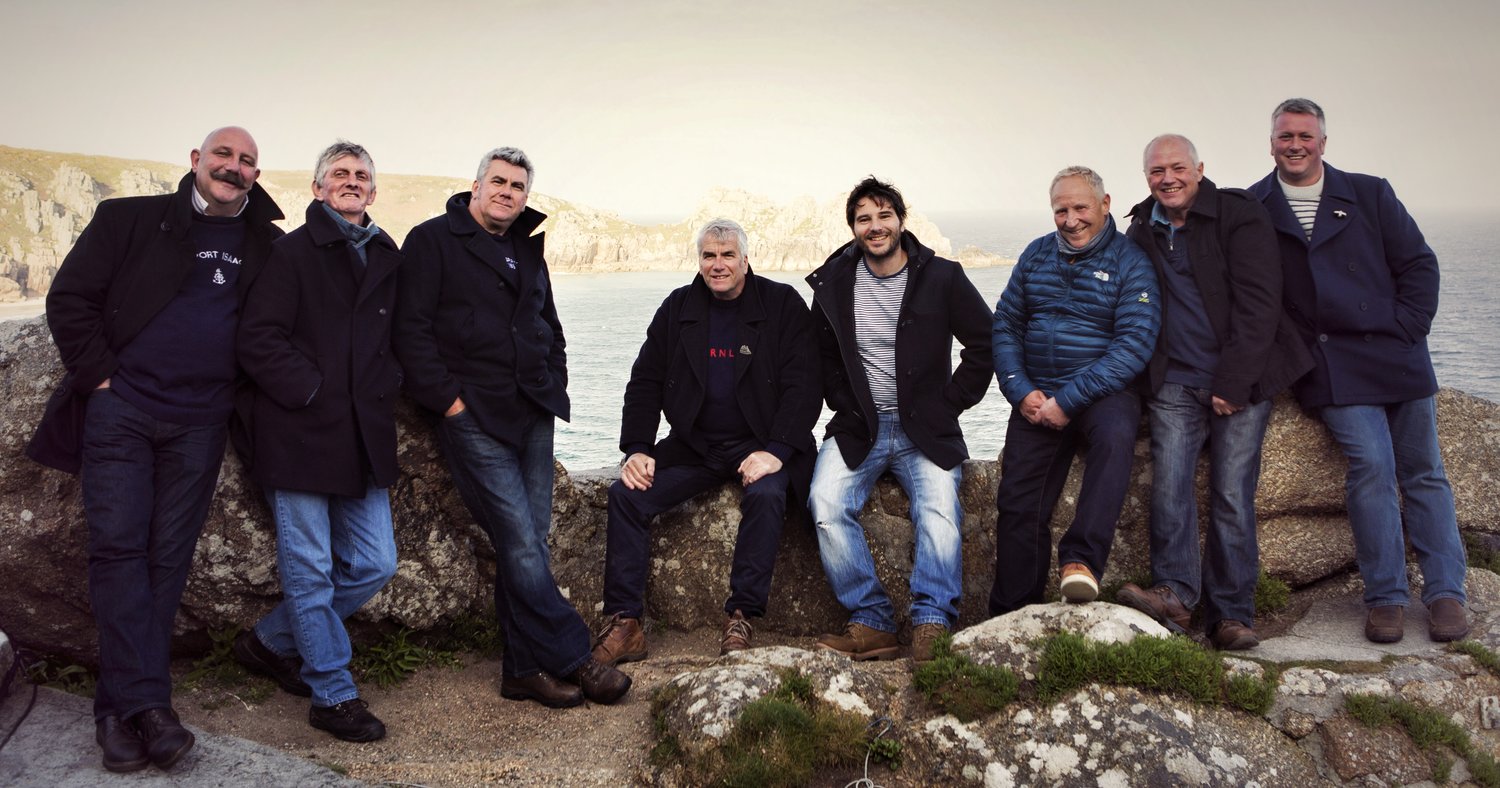
How did the group form?
It all started one Christmas. The older men in Port Isaac used to come down the pub to sing on Christmas Eve. One year some of them didn’t come and the singing never took off. I thought ‘That’s no good.’ So the next Christmas I got my brothers and close friends together and we went to my house for an hour to talk about it, until we plucked up enough courage to sing together.
But you found the courage.
We did. It did take a few beers to be fair. A few beers and a lot of biscuits!
So the group was formed intentionally, rather than coincidentally?
It was. Cornwall has a huge tradition for singing, as much as Wales. I felt we were in danger of losing some of the old Cornish songs. We take it for granted now but back then there were only a couple of groups before us. Now there are hundreds. It was a way of keeping the old traditions alive.
Why is it that Cornwall is so associated with singing?
To provide relief. Life was hard, whether working down in the mines or out on the water. Singing was part of the banter and lifted morale.
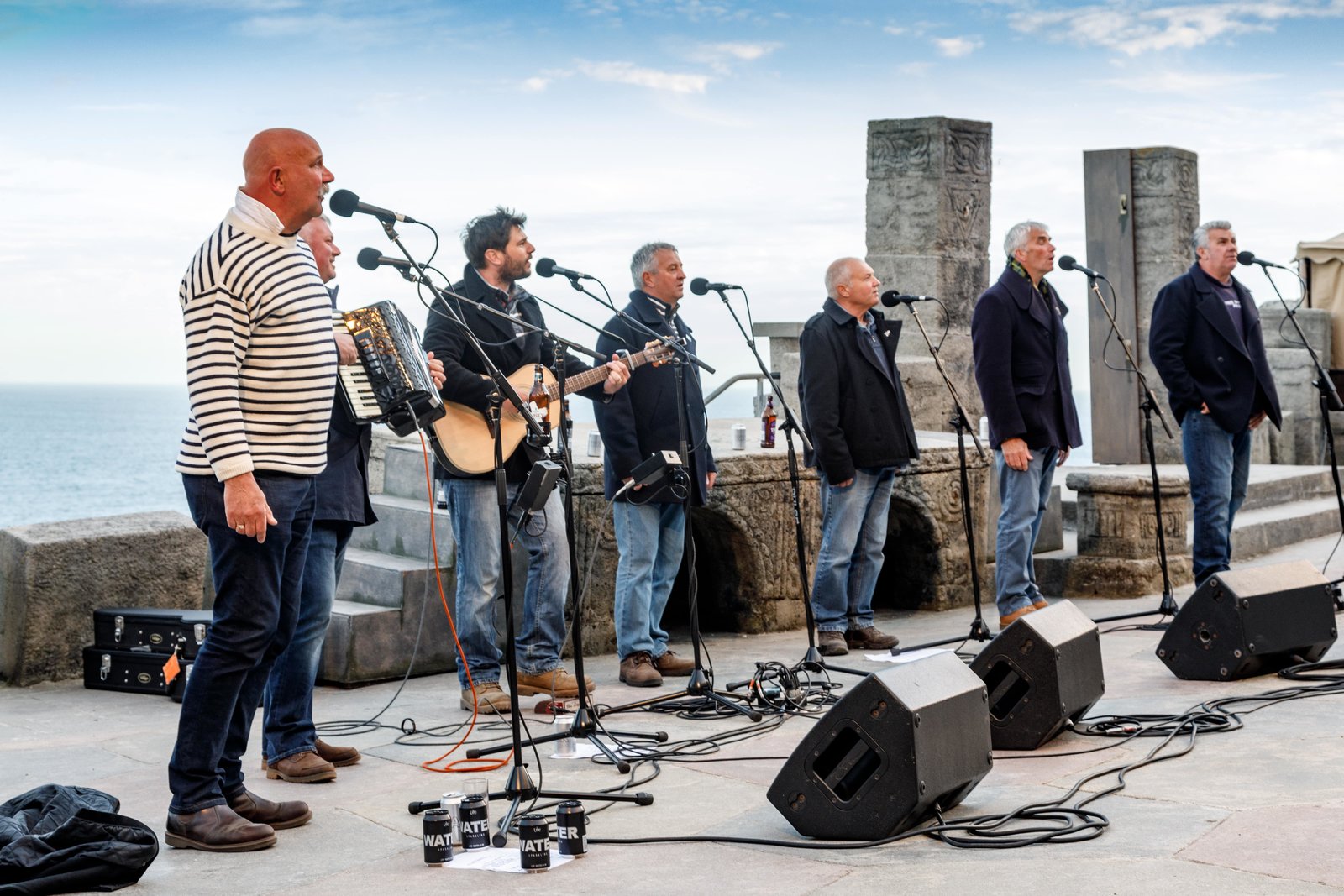
When did you first sing publicly?
One bank holiday weekend we decided to sing on the Platt (harbour). We met at the Slipway for a few beers, and it took a couple of hours before we found the nerve to jump out on the beach and sing a few songs. We sang to nobody to start with. There was just the ten of us in a little huddle self consciously singing. Then one or two people stopped to listen, and then a few more, and that’s how it began.
Did you get a good reaction?
By the time we finished there were about thirty people people watching and we did receive some applause. Most importantly, we were no longer self-conscious about singing.
What was the group’s first performance?
After that I went round to see the older fishermen and got them to sing me the songs. I wrote down the lyrics, took them back to the boys and we learnt them. Some of the much older men were actually in nursing homes, so I had the idea to go and sing to them there.
That’s a lovely idea.
I phoned the nursing homes and told them the idea and they loved it. I said we’d be there at half-past seven, but they said that wouldn’t work as the residents would all be in bed, so we had to go at five o’clock. So we sang at two nursing homes and then had a pub crawl on the way home!
When did you start performing more regularly?
After that first performance we wanted to do it every week and we started doing some local events. It’s good to have a reason to get together, have a laugh, sing and we wanted to raise some money for charities, especially Cancer and Down-Syndrome. It was never our intention to take it anywhere else.
But then it did go somewhere else! What is the story of you being ‘discovered’?
We had a phone-call from Rupert Christie, who is now our sound producer. He said we could make a record and he’d produce it. Not long after that, the radio DJ Johnnie Walker came to Port Isaac and stayed overnight in a B&B. My brother was out walking, and the B&B owner introduced them. My brother went and got a CD that we’d previously made for the lifeboat charity. Apparently, Johnnie Walker played it as he drove down to St Ives, and on the way he stopped in a lay-by to call his manager Ian Brown to tell him about it. Ian Brown then came straight down to Port Isaac and met us in the Slipway and told us we should make a record.
What was the reaction within the group?
Total disbelief. But then we asked what it would cost us. When we knew it wouldn’t cost us anything we had nothing to lose! Within a few months we did a recording and Ian Brown took it to some record companies.
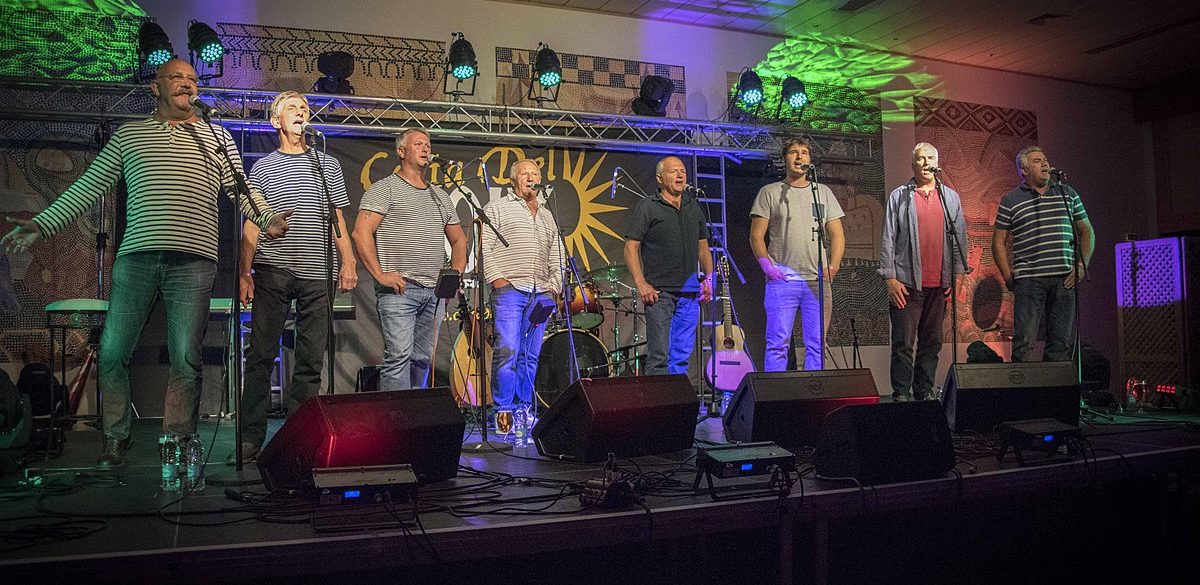
At what point did you then think it could be a success?
When we had to start doing a lot of publicity and travelling up to London. Ian was great at publicity and told us there would be a headline the next day that we’d been signed for a million pounds. He told us there wasn’t a million pounds, unfortunately, but it needed to be headline grabbing!
That morning we had to do a radio interview on the beach. We were on the beach at 7am to link with Radio Cornwall. Then we had a request to do Radio Devon. Then a few more. Then the BBC came down with a crew. And it all culminated with Sky coming down as well. We were there until five in the evening and we must have done more than forty different interviews in total.
What was the reaction within the village?
Disbelief that all of a sudden this singing group had been discovered. Even though we weren’t lost!
What have been your standout performances that you’ve done?
Probably Glastonbury, on the main stage. We also performed at the Royal Albert Hall, and at half-time during an England rugby match at Twickenham. Being backstage with all these proper stars was incredible. All of a sudden we were elevated to this high plane.
What was in your mind whilst you were performing on the main stage at Glastonbury?
A sense that this was a pinnacle. Every group wants to do it, and we were there doing it!
Who did you see backstage?
We were on the main stage with Beyonce. We had the same dressing room before her! Beyonce had her boyfriend with her. A rapper or something.
Jay-Z?
Yeah, that’s him! At the time we didn’t know who he was. We barely knew who Beyonce was to be honest. But everybody was so nice. And most people knew about the Fishy Friends!
Did you feel pressure when you were performing?
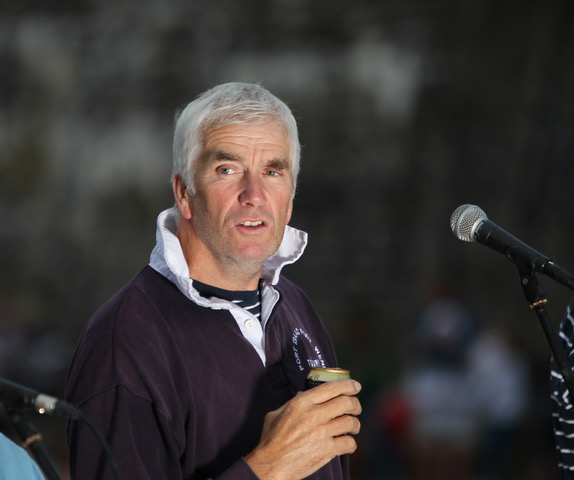
There’s always pressure involved. I still get nervous now. But at least there are ten of us. If you’re not feeling 100% we can carry each other. The first time we got a paid job was at St Ives’ festival. You have to be there early in the afternoon to do sound checks etc. I remember reading the programme and seeing that people had paid £10 each to see us. I realised it was serious and we needed to be on top form. You can’t go out and have that extra pint and miss your notes. We brought in a two pint rule after that. You can’t have more than two pints before going on stage. You can drink while you’re on stage, but not more than two pints!
In 2013, tragedy struck when group member Trevor Grills and tour manager Paul McMullen were killed in an accident ahead of a performance in Guildford, near London, after an incident with a faulty industrial door. The story made national news, but John prefers not to discuss the events of that terrible day.
How did that day affect the group?
I think ultimately it brought us all closer and made us appreciate what we had. Thinking how lucky we were and how it could have been any one of us. I was there with my two brothers, so by the law of averages it should have been one of us three. It was a strange year after that. We’ve had disasters in Port Isaac in the past, and in such a small village everyone is very close. It didn’t change the fact that we wanted to keep singing as a group. But they are in our thoughts all the time. We will never forget them.
In 2018 the Fisherman’s Friends achieved international recognition after their story was turned into a feature film. The film tells the story of the groups’ ‘discovery’ and their early road to success.
When did you first find out that the Fisherman’s Friends film was happening?
When we signed the record contract we were aware that there are lots of other rights involved. Not just music, but books and films as well. How many times can you skin a cat basically? They told us that a film might be made, but it might not. And if it did happen that the story would follow the initial ‘discovery’ of the group, but wouldn’t go any further. Then all of a sudden one day they told us there was going to be a film made. But then there wasn’t any money for it. But then they were writing drafts. The whole process took about three or four years.
How much was the group involved in the early stages?
That’s one of the funny things. My brother and Cleavie went up to London to meet the producers and writers for a chat. My brother asked ‘When did we lose control of this?’ They told him ‘You lost control the moment you signed the first contract!’ Haha! They could do what they liked. Megan and Nick (the film’s producers) had a good idea of what they wanted. But they came down to Port Isaac several times, met with us, came to some gigs. They got a really good feel of the village.
Where you pleased with the film?
Very. Everyone was very happy with the way they filmed it. We had a premiere at Newquay, which got a standing ovation, even from us lot! It could have shown us all negatively, but we were portrayed very well.
Where there any parts of the story that were noticeably accurate, or inaccurate?
Well, the pub wasn’t owned by us, and you wouldn’t get that number of people on the same fishing boat all trying to earn a living! But for example, the scene with the trouble in the pub does come from the real rivalry that exists with Padstow. And the way the manager discovered us was different of course. But even in the film he stuck his neck out for the group. And our manager has always done that for us.
How close are the characters to you all in real life?
When we started the group I was known as the ‘Old Silverback’. I used to keep them all in order, that was the way it would go. You could draw a comparison between old Jim and me; he was a bit grumpy, and what he said went. But it was still fairly generic.
So you were the leader from the start?
Er, yeah. I’ve always liked singing and it was a way of getting the gang going. It was my idea and I did a lot of organising to start with. But I’m not a natural organiser. At the start I found the sounds, conducted the group and was the main person to get things going.
Were there ever any major disagreements?
No. We were ten men and no one person had more say than anyone else.
It was announced last year that there will be a second film. What do you know about it?
So Jim’s dad has died and he goes into a dark place in his life. I think his father comes back as a ghost to tell him things will be alright. Imelda May is in the film as well. I believe they’re actually down filming now. I get information from the taxi drivers! I think they’re going out on the boat tomorrow, but they need to do that when the weather is good!
The film will be released in 2022, but in the meantime the Fisherman’s Friends story is going to the stage, and eventually the West End!
Yes, there’s a musical. It’s meant to be in production now. It’s going to open up in Truro, in the new hall there, and then if it’s successful it will go to the West End I suppose! It would be nice to get on the train and have a jolly like before!
Do you have a favourite Shanty song?
I like the simple songs really. Like the old classic, ‘South Australia’ a real rip-roarer. It’s normally our last song of the night, and if you’ve got anything left in your throat, you just give it beans!
What is your current involvement with the group?
I don’t do much of the travelling any more. None of the big performances – you need to be match fit. If people are paying to see us you’ve got to be on top form. When you’re touring you get in a rhythm. But I still sing on the beach, and for local events in or around Port Isaac.
In 2004, Port Isaac was chosen as the filming location for a new TV series called Doc Martin. Starring Martin Clunes, the show tells the story of a grumpy Doctor and his clashes with the quirky locals, which often has amusing consequences. Nine series in, Doc Martin has become a huge success, attracting millions of viewers, numerous adaptations and has been broadcast around the world.
Doc Martin wasn’t the first production in Port Isaac was it?
No, that was the original Poldark, back in the seventies. I must have been sixteen or seventeen at the time. They were the first ones that came to the village. I think it was the BBC and they did it really well. There was a lot of mining and fishing in it and I got involved as an extra and rowing boats, so it was good for me! It is set in times gone by and really portrays that historic side of Cornwall well.
What was the local reaction to Poldark, and more recently Doc Martin?
Poldark was such a novelty and we were gobsmacked at what goes on with the amount of people and equipment it took. As for Doc Martin, nobody quite realised that they would be making a long running show. Everyone thought it was going to be one or maybe two shows, nobody gave it much thought. A lot of people went to be extras! But then it became this huge success.
Was there ever any resistance in the village?
There was a little bit to begin with. There were a few people against it. A few people who didn’t want things to change and were concerned with the disruption it could bring.
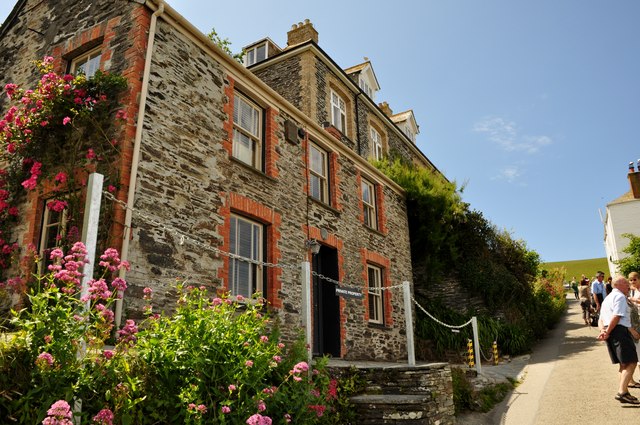
What affect has Doc Martin had on Port Isaac?
It has brought the village to the world’s attention. People come down and fill the streets and buy souvenirs. But most people in Port Isaac don’t get any money out of Doc Martin whatsoever. Although more recently the show did set-up a fund to support Port Isaac and local causes.
How much has the village changed?
I don’t think you could bring up a family in the village any more, which is a shame. Most people have at least one car, but there’s no parking, so all the houses at the top of the village are where the locals live now, not in the old village. Lots of people are discovering Cornwall and buying a property or holiday homes down here.
What’s the relationship like between the village and the Doc Martin team?
It’s pretty good. They’ve been coming here for so long now! They know when we’re in a hurry, or when the tide is going out and the fishermen have got to get to work. They’re very good at knowing where to place the cameras and who they are letting through the village. It could be easy for a film crew to think they can do what they like, but in Port Isaac it’s not like that. There is usually good co-operation.
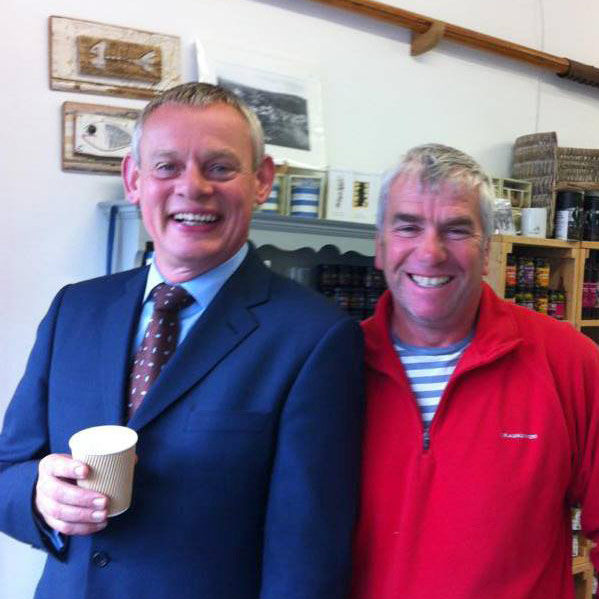
Do you know Martin Clunes?
Yes. Martin is a particularly nice chap. Always smiley and he has always got time for people. When he’s between takes he’s happy to chat to people and have a joke. But as soon as the camera is back on he is very professional. I think that he is a big part of the success of the show.
And Ian McNeice (who plays Bert Large) does a lot for local charities. He’ll open local church fetes, and if he’s not working he’ll have his bucket and raise money for the lifeboats.
Is there anyone you’ve known in Port Isaac that would fit well as a character in the show?
Real life can be just as funny as the show. There are so many characters in the village and that may be a parochial thing, as we’ve known these people all our lives. The village is a funny place and you sometimes think that they could point the camera and film that chap over there; he’s going to do something daft because he always does! Even one of the Fishy Friends is always clumsy. He’ll trip over in the street, do a commando roll and carry on like nothing happened. We always have a laugh.
We’ve had nine series of Doc Martin, will there be a tenth?
There is going to be a tenth series apparently, yes, next year.
In late 2020, Nathan Evans from Airdrie in Scotland became an internet sensation on TikTok for his version of the sea shanty Wellerman. He has since achieved international fame and a record deal.
What do you think about the story of Nathan Evans and Wellerman?
It’s a fantastic thing. It’s a catchy song, although to be honest I wasn’t familiar with it. I was familiar with the tune, which is quite standard, but has been adapted for this. When I started things down here (in Cornwall), all generations right from 8 to 80 enjoyed it. But he’s brought it to the mainstream through Tik Tok, and maybe those people hadn’t heard of sea shanties before.
Has Nathan Evans, like other groups, followed your lead in bringing Sea Shanties to popular attention?
Oh yeah, most certainly. We were the first ones to do it, to get an album, to get in the charts. But he’s getting the genre of sea shanties more attention and I think he’s caught the imagination at the right time. Fair play to the guy, he’s picked it up and run with it. I hope he gets a lot of success!
There’s a bit of a parallel, that Nathan Evans is the 2021 version of you!
Maybe! He’s very good, although I’m not sure if he’s a fisherman. And it’s a long way from the top of Scotland to the bottom of Cornwall!
What would you say to him?
It’s all about how much time he wants to spend away. He’s young, so he’ll probably be happy to do lots of festivals and concerts. He’ll get a good few years, so he should just enjoy it. While you’re singing it’s great fun. I can’t quite do that any more!
These days John Brown is no longer fishing and spends his time combining his Fisherman’s Friends commitments with his business, Port Isaac & Portwenn Walking Tours.
When did you have the idea to do walking tours in Port Isaac?
When Port Isaac started to see more visitors I used to watch people arriving and they didn’t really know where they were. They were here predominantly for Doc Martin, but there’s so much to see in the village I thought it would be a shame if they didn’t see the real Port Isaac. Just like the Fishy Friends, I wanted to carry on the history of the village, and combine it with Doc Martin and some of the stories. And that’s when I had the idea.
Do you remember your first tour?
I do. I went into the Old School Hotel when they were doing breakfast. I stood in front of 20 people while they were eating and I said ‘My name is John Brown, and I’m doing a village history tour with Doc Martin locations. If anybody is interested we start at eleven o’clock.’ I did that in a few other places in the village as well.
How many people showed up?
I think it was six or seven. It was amazing. I hadn’t even decided how much I was going to charge them! Then I thought we could turn that into something, and it worked out well.
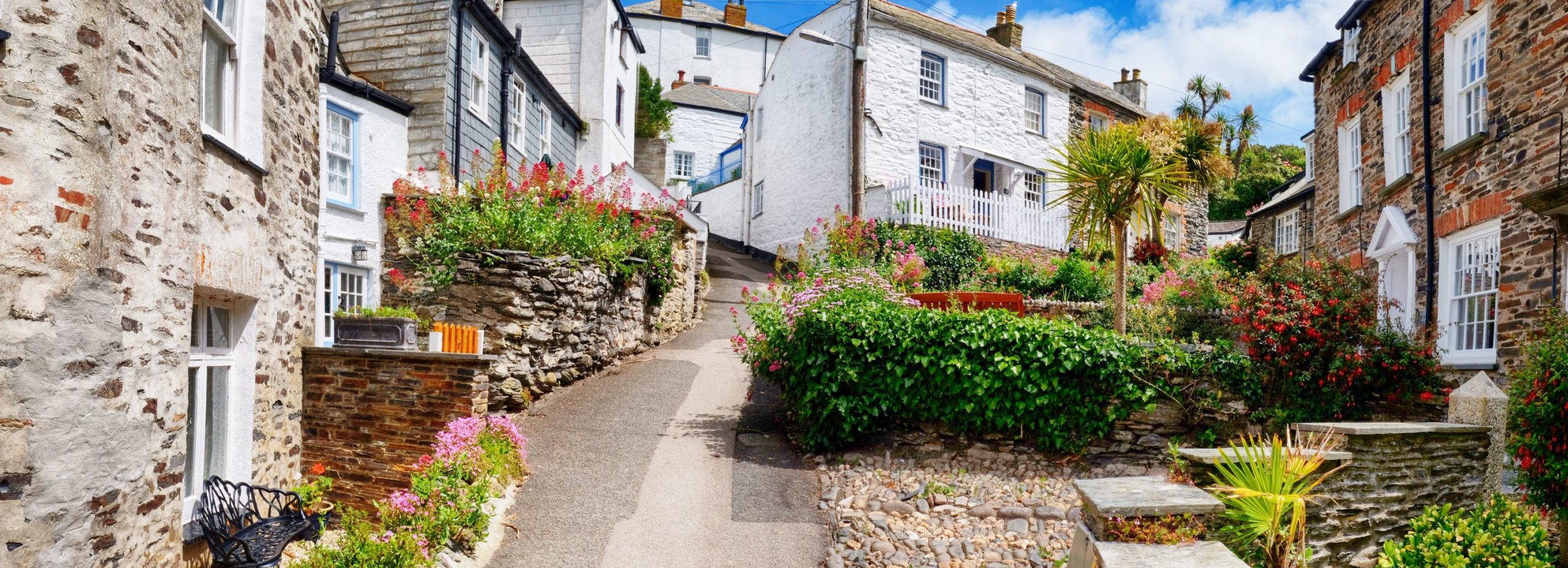
How quickly did it become a regular thing?
Within a couple of weeks. It was early on in the year, and I thought I could do the tours in the morning and then do window cleaning in the afternoon. But I didn’t like to do tours for more than fifteen people. So I’ve got two more guides working with me now, Mike and Dave.
Why is fifteen the maximum in a group?
It gets a bit impersonal after that. I don’t think people can feel free to relax and talk in big groups. And I can’t project my voice properly to a bigger group! Sometimes you have to take more, but I try and avoid it.
What do you most enjoy about doing the tours?
I like seeing the wow factor in people’s faces. Whether that is because of the beautiful cliffs or the charming little alleyways. For many people, visiting Port Isaac is a dream, and I’m often told how lucky I am to live here. I am, and I just like to share that. So many people on the tour love being here and are enthusiastic.
If people are visiting Port Isaac, what should they do?
Take the time to look around and really see the village. And they should join the tour! I did a tour in London and it really gave me the information to understand what I was looking at. In Port Isaac we can point out all of the Doc Martin places, but also tell stories and the village history. And then they can explore!
Port Isaac & Portwenn Walk & Talk offer tours daily. For more information, visit their website www.portisaactours.com.
Credits & Thanks
Painting of Port Isaac by Derek Stacey
Images of John Brown and the Fisherman’s Friends by @chrishewittphotographer
Special thanks to Mike Meakins
For more info about small-group tours to Port Isaac from London, click the link below.
Find out more